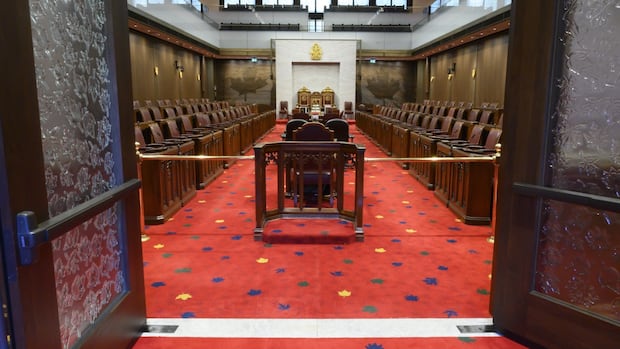[
A lawyer in British Columbia says three recent bills that aim to fast-track infrastructure and energy projects are deeply flawed and could face legal challenges.
B.C.’s Bill 15, the Infrastructure Projects Act, is aimed at fast-tracking public sector projects like schools and hospitals, as well as private projects, such as critical mineral mines, that are deemed provincially significant.
Bill 14, the Renewable Energy Projects (Streamlined Permitting) Act, aims to speed up clean energy projects across the province.
The federal Bill C-5 aims to remove interprovincial trade barriers while another, more controversial, part of the law aims to speed up projects of national interest, including energy development projects, by allowing special “designated projects” to bypass some federal laws.
“My prediction is that eventually we are going to find all three pieces of legislation in the courts,” said Hugh Braker, a B.C. lawyer who sits on the First Nations Summit’s political executive.
He said First Nations in B.C. are particularly concerned about mining and pipeline developments being pushed through their territories without consent.
“First Nations people don’t have the money for these court cases, but neither do they have the luxury of sitting back and not doing anything about it,” he said.
He said that First Nations oppose the power to pursue infrastructure and energy projects without proper consultation or environmental assessments.
The controversial bills are now law despite pushback from environmental groups and several First Nations.
Braker said the Supreme Court of Canada, through numerous court cases, has affirmed that First Nations have a right to be consulted, and proper consultation with nations on the bills did not take place.
Prime Minister Mark Carney said Thursday that Indigenous consultation is central to his major projects bill as it faces pushback from some First Nations leaders.
Bowinn Ma, the Minister of Infrastructure in B.C., said in an email to CBC News that the provincial government is fully committed to its obligations under the Declaration on the Rights of Indigenous Peoples Act (DRIPA), which mandates the province to align laws with the United Nations Declaration on the Rights of Indigenous Peoples (UNDRIP).
“I acknowledge that our engagement process for the Infrastructure Projects Act [Bill 15] was shorter than we would have liked,” Ma said. “But I want to be very clear, the Act can’t be used to shortcut Indigenous participation or reduce environmental standards.”

Bill C-5 grants the Carney government and future governments the authority to exempt pipelines, mines and other infrastructure projects from government regulation.
Near the end of the 18-page bill, it states that cabinet can exempt national-interest projects from environmental laws.
Premier David Eby has unveiled his plan to speed up mining development to boost B.C.’s economy. But as Katie DeRosa reports, the announcement was overshadowed by growing opposition to a controversial bill.
FPIC amendment to Bill C-5 turned down
The 2019 passing of DRIPA made B.C. the first province or territory in Canada to enshrine UNDRIP into law.
The Canadian Museum for Human Rights describes UNDRIP as an international human rights instrument that sets out the rights of Indigenous peoples globally.
The Canadian government followed suit in 2021, signing onto the United Nations Declaration Act (UNDA), as federal law on June 21, National Indigenous Peoples Day.
Under UNDA federally, and DRIPA provincially in B.C., all levels of government have a duty to consult with Indigenous peoples and obtain their free, prior, and informed consent (FPIC) before pursuing projects in their territories.
Cindy Woodhouse Nepinak, the national chief of the Assembly of First Nations, said in a statement that her office was given one week to review Bill C-5.
“Seven days for us is not very much time at all,” said Woodhouse Nepinak.
“It’s tough, I feel for First Nations and Canadians, ramming a bill that big through. They should have taken the summer to do it properly,” she said, noting that many First Nations have been dealing with wildfires and were unable to review the bill before it passed in Parliament.

She said the creation of an Indigenous advisory council to advise the Carney government on Bill C-5 should not impact consultation with First Nations.
“You can’t be using some body somewhere that’s picked by the government to say that that’s enough consultation for the Government of Canada with First Nations, that’s insufficient,” she said.
A statement from her office thanked Paul Prosper, a Mi’kmaw senator from Nova Scotia, who proposed an amendment to have FPIC included in Bill C-5, though it was voted down.
The Assembly of First Nations said in a statement that they are hosting a virtual forum with chiefs on July 10 to discuss amendments made to Bill C-5, ahead of the prime minister’s planned meeting with First Nations on July 17.
“It’s disheartening that First Nations were not invited to committees, I think that was a major oversight. I think the government should speak to the chiefs about that on the 17th of July,” said Woodhouse Nepinak.
Ahead of the meeting, Braker said “the fire [has] already started, I don’t know if [Carney] is going to be able to put it out.”
“He’s got to find a way to make First Nations believe him, because right now we don’t. We don’t believe him and we don’t believe the premier of B.C. either.”


